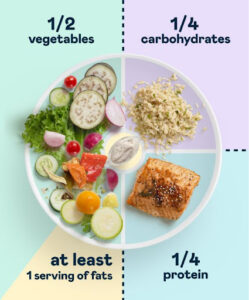Shop At Haya: Your Ultimate Shopping Guide
Discover the best shopping tips, trends, and deals for a smarter buying experience.
Eat Right, Fight Light: The Balanced Diet Game Plan
Master the art of healthy eating with our ultimate guide! Discover delicious tips to fuel your body and empower your life.
5 Essential Nutrients for a Balanced Diet: What You Need to Know
Maintaining a balanced diet is crucial for overall health, and one key aspect of this is ensuring you consume the 5 essential nutrients your body needs. These nutrients include proteins, carbohydrates, fats, vitamins, and minerals. Each of these plays a unique role in promoting bodily functions and supporting your immune system. For instance, proteins are vital for muscle repair and growth, while carbohydrates provide a necessary source of energy. Fats, particularly the healthy kinds, are important for brain health and hormone production.
Understanding how to incorporate these essential nutrients into your daily meals can help you achieve a well-rounded diet. Consider these tips:
- Prioritize Protein: Include lean meats, beans, and legumes in your meals.
- Choose Whole Grains: Opt for brown rice, quinoa, and whole-grain bread over refined grains.
- Incorporate Healthy Fats: Nuts, seeds, and avocados are great choices.
- Consume a Variety of Fruits and Vegetables: Aim for a colorful plate to ensure a range of vitamins.
- Stay Hydrated: Drink plenty of water along with balanced meals to enhance nutrient absorption.

How to Create Your Perfect Meal Plan: Tips for Eating Right
Creating a perfect meal plan is an essential step towards eating right and ensuring you meet your nutritional goals. Start by assessing your dietary needs and preferences. Consider factors such as your age, activity level, and any specific dietary restrictions. To make planning easier, jot down a list of your favorite meals and ingredients. Then, utilize this list to craft a balanced weekly menu that includes a variety of proteins, carbohydrates, and healthy fats. Use meal planning apps or templates to stay organized and keep track of your meals.
Once you have your meal plan drafted, it's time to focus on meal prep. This step is crucial for ensuring you stick to your plan. Dedicate time each week to prepare ingredients or entire meals ahead of time. You can use the following strategies for effective meal prep:
- Chop vegetables and store them in air-tight containers.
- Batch-cook grains and proteins to save time.
- Portion out snacks for easy access during the week.
By preparing in advance, you'll make healthier choices more convenient, which is key to eating right and achieving your health goals.
Myth-Busting: Common Misconceptions About Balanced Diets
When it comes to maintaining a balanced diet, many people harbor misconceptions that can lead to unhealthy eating habits. One of the most common myths is that a balanced diet must be devoid of all fats. This misconception overlooks the fact that healthy fats, such as those found in avocados, nuts, and olive oil, play a crucial role in our overall health. A balanced diet should include a variety of nutrients to support body functions, and fats are essential for hormone production and nutrient absorption.
Another prevalent misconception is that carbohydrate intake should be minimal in a balanced diet. In reality, carbohydrates are the body's primary energy source, and the key lies in choosing the right kind. Whole grains, fruits, and vegetables provide essential vitamins, minerals, and fiber that contribute to overall health. Instead of cutting out carbs completely, individuals should focus on incorporating complex carbohydrates into their diets while limiting processed sugars and refined grains. This approach ensures a comprehensive and balanced intake of nutrients.